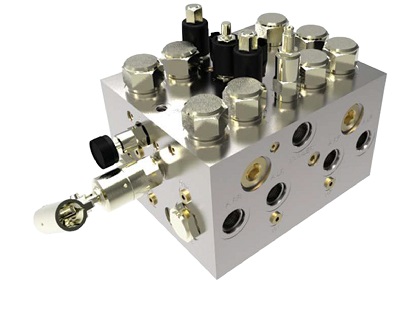As mobile-hydraulics engineers constantly aim to pack more capabilities into less space, custom screw-in cartridge manifolds can be an excellent option in many applications, according to officials at Cross Co., Greensboro, N.C. The products can address many needs of the machine builder, including small package size, design flexibility, and simplified plumbing and routing. And they can make equipment more reliable, better looking, and more unique.

Screw-in cartridge valves (SICVs) have been around for decades, but they have come into their own in the past 10 to 15 years, said Cross officials. SICVs can provide most any function in sizes that run from about 0.1 to 100 gpm, depending on the type of valve. Custom-designed manifolds used to be prohibitively expensive when purchased in small quantities. But thanks to 3D CAD software and CNC machining centers, low-quantity manifolds are now affordable for most every OEM.
The advantages of custom manifolds and SICVs are numerous. For example, a well-designed manifold will occupy less space, compared to other options. And it offers design flexibility. Some equipment benefit from one, all-inclusive manifold. Others might use “distributed control,” where two or more manifolds are strategically mounted on a machine to optimize performance and reduce plumbing. An experienced designer can review a machine and recommend the best course.
Manifolds also usually lead to fewer leaks. Reducing the number of fittings and connections also reduces the number of potential leak points. O-ring seal fittings designed into a manifold virtually eliminate leaks in a system. And by putting multiple valves in a custom-machined manifold, many external hydraulic fittings and connections are no longer needed.
Minimizing the number of discrete components also simplifies hose routing and bundling. And technicians can plumb a machine more quickly and with fewer problems to troubleshoot. Should service be required, screw-in valves are easily removed from their cavity and replaced without disturbing the plumbing. That minimizes down time and spills.
Because each SICV valve is selected and sized for its specific function, performance can be optimized for a machine’s hydraulic system. Additionally, because each component can be selected for the exact flow rate required for each function, there is no need for oversized and more-expensive components, and the cost for valving typically drops. SICVs are competitively priced and, coupled with the savings on plumbing, system costs could be dramatically reduced.
Cross Co.
www.crossco.com

